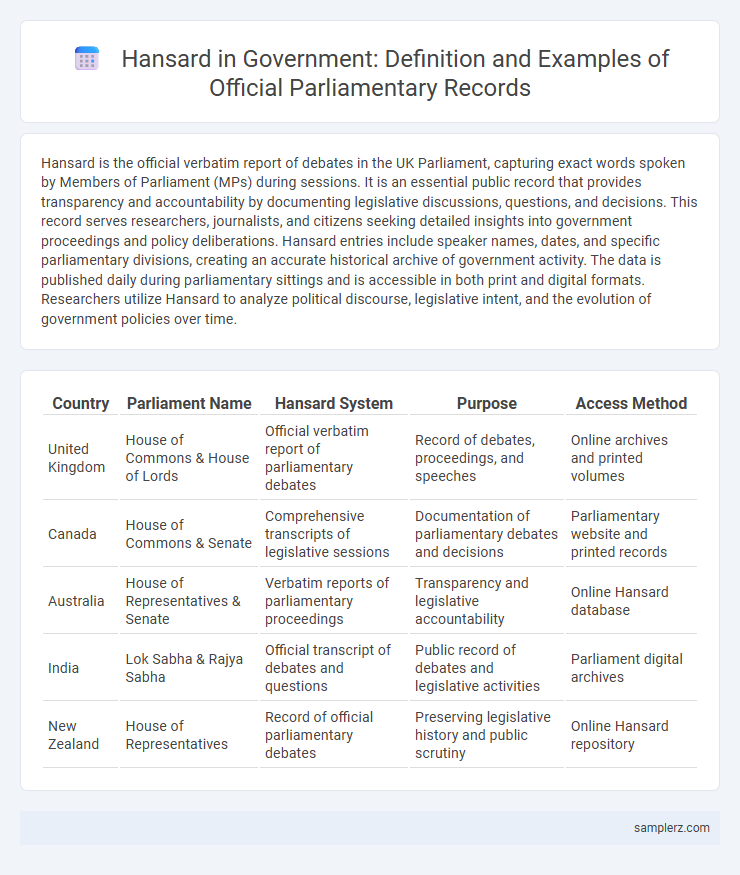Hansard is the official verbatim report of debates in the UK Parliament, capturing exact words spoken by Members of Parliament (MPs) during sessions. It is an essential public record that provides transparency and accountability by documenting legislative discussions, questions, and decisions. This record serves researchers, journalists, and citizens seeking detailed insights into government proceedings and policy deliberations. Hansard entries include speaker names, dates, and specific parliamentary divisions, creating an accurate historical archive of government activity. The data is published daily during parliamentary sittings and is accessible in both print and digital formats. Researchers utilize Hansard to analyze political discourse, legislative intent, and the evolution of government policies over time.
Table of Comparison
| Country | Parliament Name | Hansard System | Purpose | Access Method |
|---|---|---|---|---|
| United Kingdom | House of Commons & House of Lords | Official verbatim report of parliamentary debates | Record of debates, proceedings, and speeches | Online archives and printed volumes |
| Canada | House of Commons & Senate | Comprehensive transcripts of legislative sessions | Documentation of parliamentary debates and decisions | Parliamentary website and printed records |
| Australia | House of Representatives & Senate | Verbatim reports of parliamentary proceedings | Transparency and legislative accountability | Online Hansard database |
| India | Lok Sabha & Rajya Sabha | Official transcript of debates and questions | Public record of debates and legislative activities | Parliament digital archives |
| New Zealand | House of Representatives | Record of official parliamentary debates | Preserving legislative history and public scrutiny | Online Hansard repository |
Understanding Hansard: A Pillar of Parliamentary Record
Hansard serves as the official verbatim transcript of parliamentary debates, capturing every spoken word for historical and legal reference. It ensures transparency and accountability by providing an accurate and accessible record of legislative proceedings, speeches, and votes. Governments and researchers rely on Hansard to analyze policy discussions, track legislative progress, and preserve democratic dialogue.
Historical Evolution of Hansard Documentation
Hansard originated in the early 19th century as verbatim reports of parliamentary debates in the United Kingdom, evolving from fragmented shorthand notes to official, printed records authorized by the government. The introduction of standardized transcription methods and technological advancements transformed Hansard into a comprehensive and accessible public document, ensuring accountability and transparency. Today, Hansard's digital archives provide a valuable historical resource, tracing legislative discussions and governmental decisions over centuries.
Key Features of Hansard Records in Government
Hansard records in government provide verbatim transcripts of parliamentary debates, ensuring transparency and accountability in legislative processes. These records include speaker identification, timestamps, and context to accurately reflect the proceedings and facilitate public access. Hansard serves as an official, searchable archive that supports legal and historical research by documenting every spoken word during parliamentary sessions.
How Hansard Ensures Parliamentary Transparency
Hansard provides a complete and authoritative written record of all spoken debates and proceedings in Parliament, ensuring transparency by making government activities accessible to the public. Its detailed transcription holds officials accountable by documenting statements, decisions, and legislative discussions verbatim. This open access to parliamentary discourse supports democratic oversight and informed citizen participation.
Notable Examples of Hansard Entries in History
The Hansard is renowned for recording pivotal moments such as Winston Churchill's speeches during World War II, which provide detailed accounts of parliamentary debates in times of national crisis. Another notable example includes the transcriptions of debates on the abolition of the slave trade in the early 19th century, capturing key legislative discussions that shaped British history. These entries serve as invaluable resources for historians analyzing government policies and political rhetoric.
The Process of Compiling Hansard Transcripts
Hansard transcripts are meticulously compiled through a multi-step process involving real-time stenographic transcription of parliamentary debates, followed by thorough editing for accuracy and clarity while preserving the speakers' original intent. Editors cross-check transcripts against audio recordings to ensure verbatim accuracy and remove any unparliamentary language or errors. The finalized documents are then published as official records, providing an authoritative account of legislative proceedings for government transparency and public reference.
Hansard’s Role in Legislative Accountability
Hansard serves as the official verbatim report of parliamentary debates, ensuring transparency by providing an accurate and accessible record of legislative proceedings. This detailed documentation enables constituents, journalists, and policymakers to scrutinize government actions and hold legislators accountable for their statements and decisions. By preserving a comprehensive archive of debates, Hansard supports democratic oversight and fosters informed public discourse in the legislative process.
Hansard Access: Availability to the Public
Hansard access is widely available to the public through official government websites, providing comprehensive verbatim records of parliamentary debates and proceedings. Digital archives often allow keyword search functionality, enabling users to locate specific topics, speakers, or dates with ease. Many jurisdictions also offer downloadable formats and scheduled updates to ensure transparent and timely access to legislative discussions.
Comparing Hansard Practices Across Countries
Hansard records in the United Kingdom provide a comprehensive and verbatim account of parliamentary debates, setting a global standard for transparency in government proceedings. In Canada, the Hansard system adopts a similar approach but includes simultaneous translation in both English and French to accommodate bilingual legislative requirements. Australia's Hansard emphasizes timely digital publication, enhancing public access while maintaining accuracy in documenting parliamentary discourse.
Technological Advancements and the Future of Hansard
Hansard has evolved with technological advancements such as digital transcription and AI-powered speech recognition, enhancing the accuracy and speed of parliamentary records. Real-time online publishing allows greater transparency and accessibility for the public and researchers seeking legislative insights. Future developments may integrate blockchain for secure record-keeping and machine learning to analyze legislative trends and public sentiment.

example of Hansard in record Infographic
 samplerz.com
samplerz.com